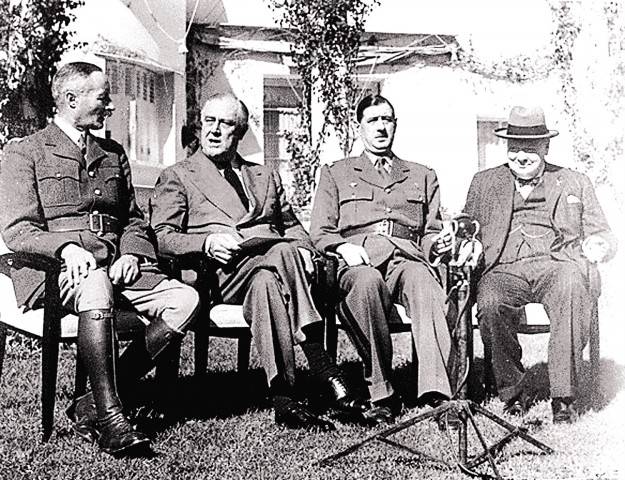
This photograph was taken on January 24, 1943, at the press conference by President Franklin D. Roosevelt who announced that the Allies were fighting for the “unconditional surrender” of Germany, Italy and Japan - a stand immediately endorsed by British Prime Minister Winston Churchill.
President Franklin Roosevelt and British Prime Minister Winston Churchill met at Casablanca in Morocco to work on strategy during World War II. At the conclusion of the conference, Roosevelt and Churchill held a joint news conference at which Roosevelt surprisingly announced that peace would come “by the total elimination of German and Japanese war power. That means the unconditional surrender of Germany, Italy and Japan.”
The Casablanca Conference was held at the Anfa Hotel in Casablanca, French Morocco, from January 14 to 24, 1943, to plan the Allied European strategy for the next phase of World War II. Also attending were the sovereign of Morocco Sultan Muhammad V and representing the Free French forces Generals Charles de Gaulle and Henri Giraud, but they played minor roles and were not part of the military planning. USSR general secretary Joseph Stalin declined to attend, citing the ongoing Battle of Stalingrad as requiring his presence in the Soviet Union.
The conference’s agenda addressed the specifics of tactical procedure, allocation of resources, and the broader issues of diplomatic policy. The debate and negotiations produced what was known as the Casablanca Declaration, and perhaps its most historically provocative statement of purpose, “unconditional surrender.” That doctrine came to represent the unified voice of implacable Allied will and the determination that the Axis powers would be fought to their ultimate defeat.
President Franklin Roosevelt and British Prime Minister Winston Churchill met at Casablanca in Morocco to work on strategy during World War II. At the conclusion of the conference, Roosevelt and Churchill held a joint news conference at which Roosevelt surprisingly announced that peace would come “by the total elimination of German and Japanese war power. That means the unconditional surrender of Germany, Italy and Japan.”
The Casablanca Conference was held at the Anfa Hotel in Casablanca, French Morocco, from January 14 to 24, 1943, to plan the Allied European strategy for the next phase of World War II. Also attending were the sovereign of Morocco Sultan Muhammad V and representing the Free French forces Generals Charles de Gaulle and Henri Giraud, but they played minor roles and were not part of the military planning. USSR general secretary Joseph Stalin declined to attend, citing the ongoing Battle of Stalingrad as requiring his presence in the Soviet Union.
The conference’s agenda addressed the specifics of tactical procedure, allocation of resources, and the broader issues of diplomatic policy. The debate and negotiations produced what was known as the Casablanca Declaration, and perhaps its most historically provocative statement of purpose, “unconditional surrender.” That doctrine came to represent the unified voice of implacable Allied will and the determination that the Axis powers would be fought to their ultimate defeat.

